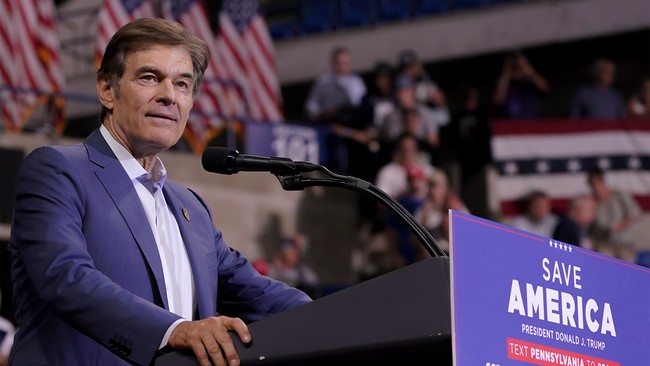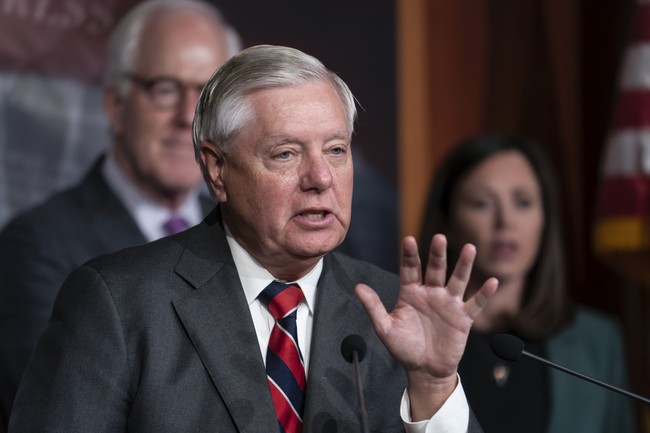Trump's New Healthcare Nominee Sparks Debate
In a move stirring both excitement and controversy, Donald Trump nominates Dr. Mehmet Oz to lead crucial healthcare agencies in the U.S., focusing on Medicare and Medicaid policies.
Published November 21, 2024 - 00:11am

Image recovered from redstate.com
In a significant announcement, President-elect Donald Trump has selected the renowned surgeon and television personality, Dr. Mehmet Oz, as his nominee to lead the Centers for Medicare and Medicaid Services (CMS). Oz's nomination reflects Trump's ongoing focus on healthcare reform and signals a continuation of policy debates ignited during his previous administration. The CMS plays a crucial role in managing extensive healthcare programs, including Medicare, Medicaid, the Affordable Care Act, and the Children's Health Insurance Program (CHIP).
Dr. Oz, who rose to prominence through his work as a heart surgeon and television show host, is expected to steer CMS policies under the guidance of Robert F. Kennedy Jr., Trump's choice for the Department of Health and Human Services. Trump's selection of Oz underscores a strong emphasis on combating what he described as the 'illness industrial complex' and addressing chronic diseases. As a high-profile advocate of healthy living, Oz is tasked with leading formidable changes to a healthcare system that Trump claims is both economically wasteful and systemically flawed.
The decision to nominate Dr. Oz has invited mixed reactions. On one hand, it has been met with enthusiasm by certain segments of the healthcare industry, who highlight Oz's exposure to medical technologies and patient care as a boon to policy reforms and service delivery. On the other, Oz's history of endorsing controversial health products has led some critics to question his suitability for such a significant role. Dr. Peter G. Lurie, representing the Center for Science in the Public Interest, has expressed concern regarding Oz's history of promoting unproven supplements and therapies, citing potential risks to public trust in medical governance.
The reaction from large healthcare players such as Pfizer reflects a cautiously optimistic stance. Pfizer's CFO, Dave Denton, acknowledges the potential benefits of accelerated regulatory pathways that Oz's leadership might foster, while also highlighting lingering resistance to vaccine policies among certain healthcare subsets. This divide exemplifies the broader dichotomy faced by the incoming administration: balancing rapid innovation with maintaining public confidence in health standards.
Within political circles, the nomination is steeped in strategic significance. During the 2022 Senate race in Pennsylvania, Dr. Oz ran unsuccessfully against Senator John Fetterman. This history adds an intriguing layer to Oz's nomination, as Senate approval is required for his new role. Fetterman, who has previously been Oz's political adversary, has expressed openness to supporting Oz's appointment, conditional on Oz committing to the preservation of Medicare and Medicaid.
As Dr. Oz prepares for his potential future in public office, he brings with him a dual perspective of both the healthcare sector and the entertainment industry, uniquely positioning him to engage with diverse constituencies. His understanding of public health is complemented by his experience communicating complex medical subjects to mainstream audiences. This background is expected to play a key role in shaping his policy approach at CMS.
If confirmed, Dr. Oz will inherit an agency dealing with immense budgetary pressures and a mandate to reduce costs while improving healthcare outcomes. Trump has voiced a desire for Oz to curb what he views as excessive spending within CMS, which accounts for a significant share of the national budget. Oz's appointment may thus herald a phase of reform aimed at increasing efficiency and accountability, aligning with Trump's broader goals of fiscal prudence.
The discourse surrounding Oz's nomination sheds light on ongoing tensions within U.S. health policy, particularly concerning how best to balance innovation, accessibility, and trust. As debates persist on Capitol Hill and beyond, the outcome of this nomination process could have lasting implications for both American healthcare policy and the broader political landscape.






